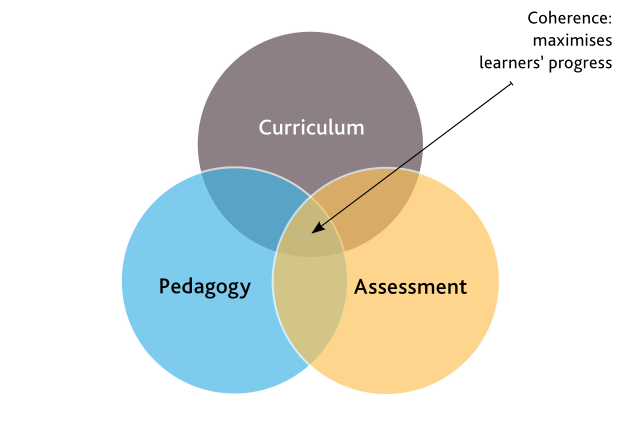Implementing Cambridge Curriculum in Schools Part 1 ‒ Labkafe
There is a new wave coming from across the world, and we expect it to sweep off the existing education system and build a new order. This is the Cambridge curriculum and today we will discuss how to implement it for Indian schools. This new education system is recognized and preferred by most of the reputed universities and institutes around the world. And it’s coming to your doorstep now!
So, what is the Cambridge curriculum anyway? It is a very well-recognized system of education that any school can implement without disturbing the influence of the local culture and yet deliver students capable of entering any university across the globe. The “Cambridge Pathway” aims to internationalize the education system at the undergraduate level. It is well-known and accepted in most universities, institutes, and leading businesses.
The Cambridge curriculum has grown out of a British system of education, which divides the system into four parts ‒ Cambridge Primary, Cambridge lower secondary, Cambridge upper secondary, and Cambridge advanced. Together, they are called the Cambridge Pathway ‒ for a child to grow into a responsible, skillful, world-worthy worker and citizen.
A highly flexible and adaptive system, the Cambridge curriculum lets you pursue your local boards of education but also implement the Cambridge pathway. Both inspiring and challenging, it rewards students with an inquisitive mind and helps the more challenged ones to grow personally and think on their own.
20 Questions to Ask Before Building the Cambridge Curriculum
To accomplish anything, you have to ask the right questions to yourself (or the working body). To build a Cambridge curriculum is no different either. Here are some pertinent questions for your meeting table when you decide to go the Cambridge way. These questions assume that the school is offering an existing qualification (like CBSE, ICSE, or similar) already and wants to upgrade to an international level.
- What is your goal? What social, personal, and academic outcomes do you expect out of your syllabus?
- What skills will this curriculum grant to the students?
- Is this curriculum capable of motivating, engaging, and challenging the students? How?
- Which Cambridge subjects and programs will you include in your curriculum?
- If selected, how will the above work with the existing curriculum in your institute?
- How will you implement local and national culture into the curriculum?
- The Cambridge curriculum is a highly English-dependent system. Which subjects will you teach in English? If your students don’t have fluency in understanding, speaking, and writing English, how do you plan to support them?
- Does the curriculum make progression from one level to another a fluid process, or are there gaps that need to be filled?
- What is your detailed plan of assessment procedure for this curriculum?
- Will the teachers need any special training to teach this syllabus? How do you plan to give them that support? And how will you determine that they stay on track afterwards?
- Do you have an effective governance and teaching structure in place to handle the new load? Or if not, then what should that structure be?
- How will you measure the impact of your curriculum, and how will you know that your students are actually learning things, irrespective of exam results?
- Do you have any inter-school network through which the administration and the teachers can take help with this curriculum?
- How much of this curriculum will be learned in theoretical classes and how much will be learned from hands-on practical classes?
- How many hours will be spent studying which particular subjects at different levels? And how much of that time shall be divided between theory and practical sessions?
- Does the school have a proper laboratory setup like lab furniture and lab equipment to cover the hands-on learning part of this curriculum?
- Does the curriculum offer elective subjects? Can the school balance the resource requirements for a prediction of electives that may be taken by the students?
- How does the community interact with this curriculum? Would the students have opportunities to involve with the community/society through this?
- Can external groups make any contributions to the curriculum? Conversely, can your students perform in any outreach program serving the community?
- What facilities do you require to fulfill the learning environment needs for the specialist subjects in this curriculum?
Answering all of the above questions satisfactorily is the key to building a Cambridge curriculum for your school. Your school should meet all the requirements as mentioned above and then have some breathing space for the future.

Basic Principles for a Successful Cambridge Curriculum Design
Consistency
The thing you need to remember here is that the Cambridge curriculum does not work in a one-size-fits-all kind of way. The various schools taking up this curriculum operate in a wide variety and scope, such is its flexibility. School leaders must remember that a fluid continuity is the key to this learning system.
Therefore, they should not only consider exactly which subjects a student should study every year, but also that there should be a clear path of consistent progression during the student’s career ‒ be it in any specialization. Each level change should feel natural and unjarring to the students, and they should not have to go out of their way to learn new subjects.
Vision and Mission
The values and aims of your school should match perfectly with your curriculum design. If, for example, your objective is to build a more skilled workforce for the country, then your Cambridge curriculum should mix a lot of hands-on learning with a good dose of local and national culture. However, if you foresee your students spreading all over the world, then your curriculum should include more topics covering international cooperation and how the world is bound together in life, in business, and in politics. Anyway, your choice of subjects and activities should be holistic to your objectives.
Quality over Quantity
A natural question comes when deciding on any course curriculum ‒ why not just all subjects and all content, surely that would teach everything to a student? But we have to ask ourselves ‒ does the real world work that way? Can a student learn everything in one walkthrough of school life? The answer is a hard no, and that won’t change until we’ve genetically engineered superbrains and learned to slow down time.
Instead, your goal while implementing a Cambridge curriculum should be to maximize learning in a few subjects pertaining to a student’s Cambridge pathway, supported by some other subjects that let them be aware of how the world works. Too much content in one subject also does not result in better learning (almost always). Instead, let the learner maximize understanding of the basic, key points and encourage them to explore further on their own.

Balance of Knowledge
While the school’s vision does guide the breadth and depth of the subjects you will integrate into the curriculum, a balance must be struck somewhere pertaining to developing a sense of context of the specialty subject. Normally, a balanced diet for the studying mind includes mathematics, languages, sciences, technology, humanities, creative arts, and physical education. Covering these from the lower level broadly will expose the students to the actual world which consists of a bit of everything to make a project succeed.
Secondly, some subjects are special in the way that they are more integrated with many other subjects. Instead of teaching them as discrete subjects, your strategy should better include their implementation in other subjects while teaching them. Mathematics and Information Technology are two good examples of such subjects that are present in almost everything, even art. Further examples should be literacy and numeracy ‒ teachers of all subjects should be well-read and have a clear calculative mindset that makes sure that the students will be capable of working in their discrete subjects with good support.
Reaching Up
Your school’s duty is to prepare students for the world, on a national or international level. As such, your Cambridge curriculum should gear up your students to be compatible with the entrance criteria of most renowned universities or businesses. This becomes more and more important as the student goes through the Pathway and becomes more and more specialized.
Implementing a robust syllabus is a good way to achieve the above, but there are other ways too. As school leaders you can incorporate various support programs and activities into the curriculum, especially at the later stages, to give the students the industry and higher education exposure they need.
Inter-curriculum Compatibility
We have previously assumed that your school already offers some other sort of qualification under other common boards like CBSE or ICSE. It is very important that your new Cambridge curriculum be compatible with your existing curriculum. The reason behind this lies in the fact that many students choose to move in and out of specific teaching systems as their needs fit them. If, for example, one of your students wants to migrate from class VI to Cambridge Lower Secondary, the process should be smooth and not jarring.
Coherency
Perhaps this goes without saying, but an educational system should be more than just the sum of its parts. The content of a curriculum, its textbooks, its resources, and its assessing systems should all work together and be interconnected to reinforce each other. You can only call your international curriculum successful when the content of the curriculum, the pedagogical approach, and the assessment system all work together to maximize students’ learning development, achievement, and above all, the ability to see and work with the big picture.

Designing the School Curriculum with Cambridge
As mentioned above, the Cambridge Pathway is divided into four levels ‒ Primary, Lower Secondary, Upper Secondary, and Advanced. Here are some useful details about these levels to utilize while designing your Cambridge curriculum.
Cambridge Primary
- Age group: 5 to 11 years
- Builds a basic understanding of how the world works.
- Subjects available (none are compulsory):
- Art & Design
- Digital literacy
- English
- English as a second language
- Cambridge Global Perspectives
- Computing
- Mathematics
- Music
- Physical education
- Science
- Each subject can be divided into “strands” to navigate it easier and in more practical ways. For example, English can have four strands ‒ reading, writing, speaking, and listening.
- Assessments should be targeted toward identifying the strength and weaknesses of the students.
- Cambridge Primary Checkpoint: an end-of-the-line assessment test for the Cambridge Primary level, that grades students with only English (both first and second), mathematics, and science. The Global Perspectives subject is graded through a team project. Any student from another discipline completing the Checkpoint is awarded a special achievement status.
Cambridge Lower Secondary
- Age group: 11 to 14 year
- Bridges gap between primary education and board exam levels.
- Subjects:
- Art & Design
- Digital literacy
- English
- English as a second language
- Cambridge Global Perspectives
- Computing
- Mathematics
- Music
- Physical education
- Science
- Subjects can be similarly divided into strands to ease the learning process.
- Assessments should be good enough to provide an international benchmark of the student’s capabilities.
- Cambridge Lower Secondary Progression: for each stage, students can be directed to sit for this exam whenever the teacher feels they are ready.
- Cambridge Lower Secondary Checkpoint: The final test of the level, it evaluates the subjects English (both first and second), Math, and Science. Cambridge Global Perspectives is graded through a research paper.

Cambridge Upper Secondary
- Also known as IGCSE (International General Certificate of Secondary Education).
- Age group: 14 to 16 years
- Provides an excellent educational platform to build upon in the Advanced or Diploma levels, or can also provide qualification for some professions.
- Designed as a two year program, but students can choose to take it over a 1-year or 3-year course.
- Subjects: over 70 subjects with almost any possible combination (except a few ‘barred’ combinations). Here is the full list of IGCSE subjects .
- Some subjects offer an “Extended” or “Supplementary” or “Advanced” tier. The ‘normal’ versions of those subjects are marked as “Core”. This extra education is elective. For example, a student can take Core Physics, OR Extended Physics that includes the core content plus something extra.
- Local assessments should give the students a grade for each subject course they complete.
- Cambridge IGCSE Assessment: taken at the end of the upper secondary source, it includes written, practical, oral, and coursework assessments.
- Grading is given in a scale of A* to G (from C to G for core subjects) in graduation from best to worst performance.
Cambridge Advanced
- Topmost level of the Cambridge Pathway, intended to prepare students for entry into the leading universities and businesses across the world.
- Also called the AS & A levels.
- Age group: 16 to 19 years
- Builds deep understanding, critical analysis, and independent thinking.
- Subjects: over 50 with any combination. Full list here .
- Assessments would include formal written exams, orals, practicals, and coursework; gradation is from A* to E.
- Pre-U (university entrance) exams are held at the end of a two year course, grading from D1 to P3. Pre-U courses are available by special request.
To Be Continued…
This article discussed what the aim and scope of your school leadership thought process should be to implement the Cambridge international curriculum at your school. We have discussed at length questions that need to be answered before starting the curriculum design, and basic principles to adhere to while building it. We have also given you a razor-edge overview of the Cambridge Pathway ‒ should you want to implement it in full or part.
In the next article about building a Cambridge curriculum for your school, we will discuss in detail about the subject distribution in each course, pedagogy, and the signature subject of the system ‒ the Global Perspectives progression. Till then, have a nice time!